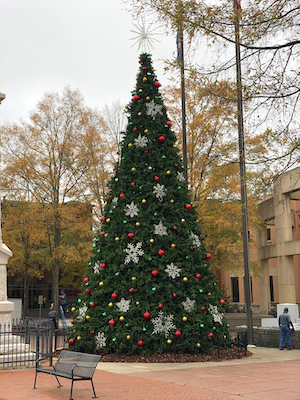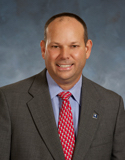GOP Enabling of Trump Behavior Led to Wednesday's Events
 Thursday, January 7, 2021 at 10:15AM
Thursday, January 7, 2021 at 10:15AM BY STEVE PEOPLES, AP Chief Political Writer
The insurrection at the U.S. Capitol was both stunning and predictable, the result of a Republican Party that has repeatedly enabled President Donald Trump's destructive behavior.
When Trump was a presidential candidate in 2016, Republican officials ignored his call to supporters to “knock the crap out” of protesters. Less than a year after he took office, GOP leaders argued he was taken out of context when he said there were “very fine people” on both sides of a deadly white supremacist rally.
Last summer, most party leaders looked the other way when Trump had hundreds of peaceful protesters forcibly removed from a demonstration near the White House so he could pose with a Bible in front of a church.
But the violent siege on Capitol Hill offers a new, and perhaps final, moment of reckoning for the GOP. The party's usual excuses for Trump — he's not a typical politician and is uninterested in hewing to Washington's niceties — fell short against images of mobs occupying some of American democracy's most sacred spaces.
The party, which has been defined over the past four years by its loyalty to Trump, began recalibrating in the aftermath of Wednesday’s chaos.
One of Trump's closest allies in Congress, GOP Sen. Lindsey Graham of South Carolina, said “enough is enough.”
Rep. Nancy Mace, R-S.C., said Trump’s accomplishments in office “were wiped out today.”
Trump's former acting chief of staff Mick Mulvaney, now a special envoy to Northern Ireland, joined a growing number of administration officials who are resigning. “I can’t do it. I can’t stay,” Mulvaney told CNBC on Thursday. "Those who choose to stay, and I have talked with some of them, are choosing to stay because they’re worried the president might put someone worse in.”
Stephanie Grisham, the first lady Melania Trump's chief of staff and a former White House press secretary, submitted her resignation. Deputy national security adviser Matt Pottinger, White House social secretary Rickie Niceta and deputy press secretary Sarah Matthews also resigned, according to officials.
For the party to move forward, it will need to deal with the reality that Trump lost to President-elect Joe Biden by more than 7 million votes and a 306-232 margin in the Electoral College, a result Congress certified early Thursday when it finished accepting all the electoral votes.
Trump acknowledged his term was coming to a close, but not that he had actually lost.
“Even though I totally disagree with the outcome of the election, and the facts bear me out, nevertheless there will be an orderly transition on January 20th," he said in a statement minutes after Congress certified the vote. "I have always said we would continue our fight to ensure that only legal votes were counted. While this represents the end of the greatest first term in presidential history, it’s only the beginning of our fight to Make America Great Again!”
Former Republican President George W. Bush described the violent mob as “a sickening and heartbreaking sight." He declined to call out Trump or his allies, but the implication was clear when Bush said the siege “was undertaken by people whose passions have been inflamed by falsehoods and false hopes.”
Rep. Liz Cheney of Wyoming, a top House Republican and the daughter of Bush's vice president, was much more direct in an interview on Fox News.
“There's no question the president formed the mob. The president incited the mob," Cheney said. “He lit the flame.”
Bush and Cheney were already among a smaller group of Republican officials willing to condemn Trump's most outrageous behavior at times. The overwhelming majority of the GOP has been far more reserved, eager to keep Trump's fiery base on their side.
Still, Trump's grip on his party appeared somewhat weakened when members of Congress returned to the Capitol on Wednesday night, having spent several hours hiding in secure locations after being evacuated. Before they left, a handful of Republican senators and more than 100 Republican House members were set to oppose the vote to certify Biden's victory.
It was a move led by Sens. Ted Cruz of Texas and Josh Hawley of Missouri, each with his own 2024 presidential ambitions, over the objection of Senate Majority Leader Mitch McConnell, who warned that that U.S. democracy “would enter a death spiral” if Congress rejected state election results.
When they resumed debate, however, much of the energy behind the extraordinary push had fizzled. Several Republicans dropped their objections altogether. Hawley and Cruz did not, but they offered scaled-back arguments.
Hawley condemned the day's violence but also called for an investigation into “irregularities and fraud.” Earlier in the day, his hometown newspaper, The Kansas City Star, released an editorial charging that Hawley “has blood on his hands" for enabling Trump's false claims.
Other Republicans were clearly more concerned about the day's violence and the events that preceded them.
“Dear MAGA- I am one of you,” former White House aide Alyssa Farah tweeted. “But I need you to hear me: the Election was NOT stolen. We lost.”
Jefferson Thomas, who led Trump’s campaign in Colorado, expressed some regret about joining Trump’s team in the first place, calling Wednesday’s events “an embarrassment to our country.”
“This isn’t what I ever imagined when I signed up to #MAGA. Had I known then that this is how it would end, I never would’ve joined,” he wrote on Twitter.
While there were obvious cracks in Trump's grip on the Republican Party, his fiercest detractors came from a familiar pool of frequent critics.
Trump's former secretary of defense, Jim Mattis, who denounced the president as a threat to the Constitution last year, described the violent assault on the Capitol as “an effort to subjugate American democracy by mob rule" and "was fomented by Mr. Trump.”
“His use of the presidency to destroy trust in our election and to poison our fellow citizens has been enabled by pseudo political leaders whose names will live in infamy as profiles in cowardice,” Mattis said.
Anthony Scaramucci, who served briefly as Trump’s White House communications director in 2017, often has harsh words for Trump. But he offered his harshest on Wednesday for Trump’s Republican enablers.
“Republican elected officials still supporting Trump need to be tried alongside of him for treason,” he tweeted.
 Editor | Comments Off |
Editor | Comments Off | 






